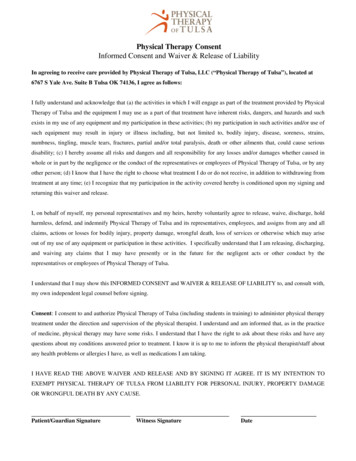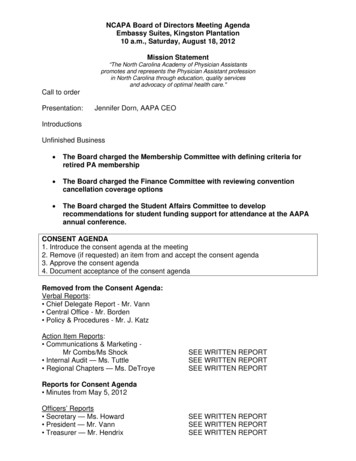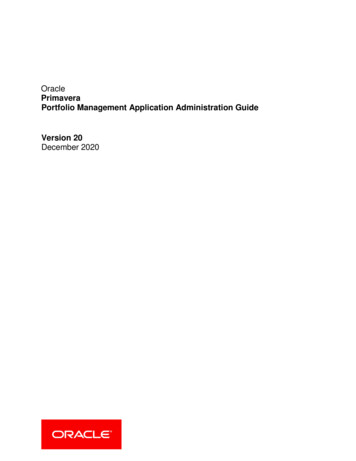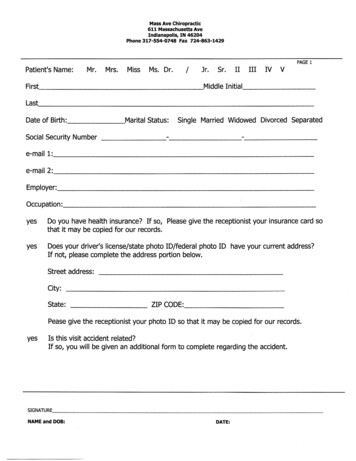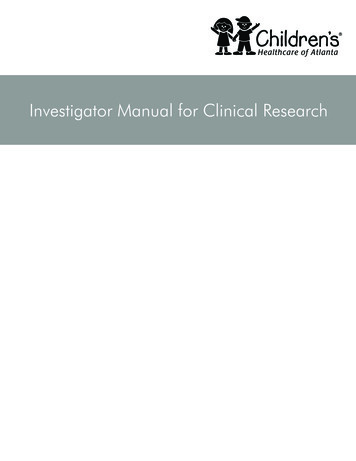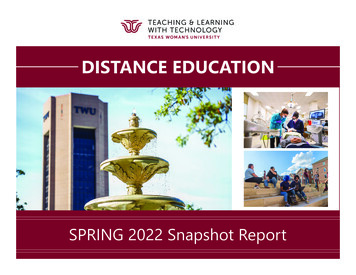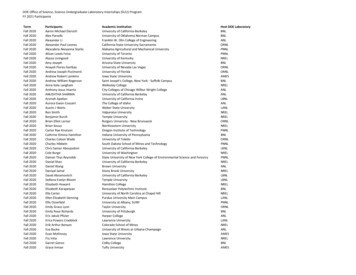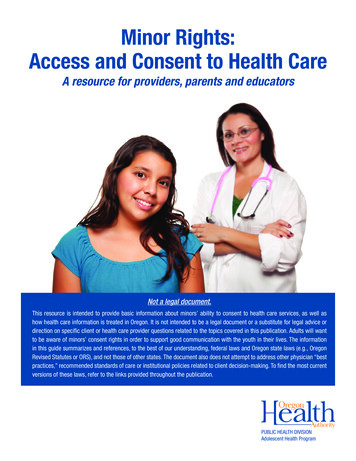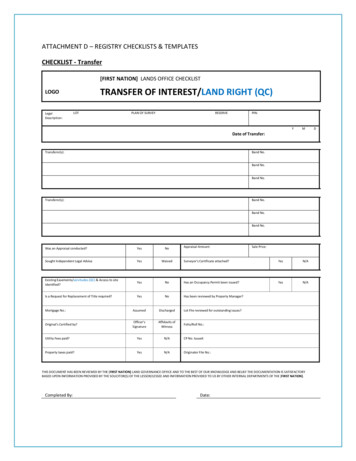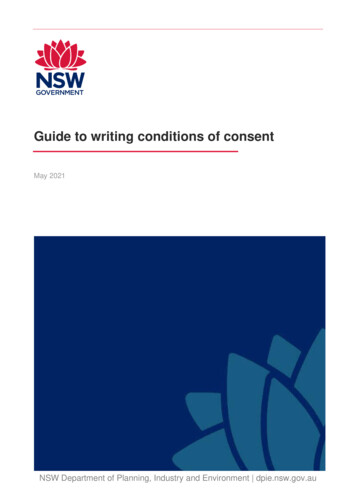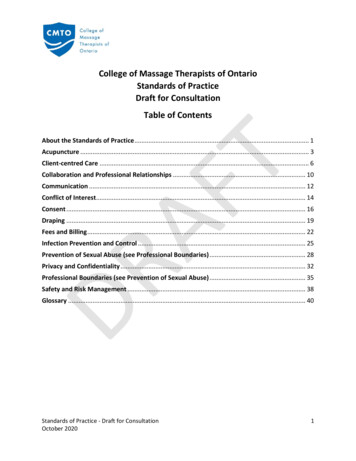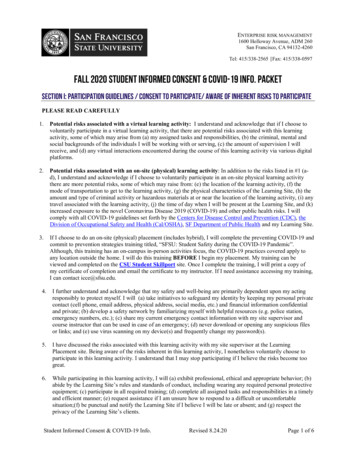
Transcription
ENTERPRISE RISK MANAGEMENT1600 Holloway Avenue, ADM 260San Francisco, CA 94132-4260Tel: 415/338-2565 Fax: 415/338-0597FALL 2020 STUDENT Informed CONSENT & COVID-19 info. PACKETSECTION I: PARTICIPATION GUIDELINES / CONSENT TO PARTICIPATE/ AWARE OF INHERENT RISKS TO PARTICIPATEPLEASE READ CAREFULLY1.Potential risks associated with a virtual learning activity: I understand and acknowledge that if I choose tovoluntarily participate in a virtual learning activity, that there are potential risks associated with this learningactivity, some of which may arise from (a) my assigned tasks and responsibilities, (b) the criminal, mental andsocial backgrounds of the individuals I will be working with or serving, (c) the amount of supervision I willreceive, and (d) any virtual interactions encountered during the course of this learning activity via various digitalplatforms.2.Potential risks associated with an on-site (physical) learning activity: In addition to the risks listed in #1 (ad), I understand and acknowledge if I choose to voluntarily participate in an on-site physical learning activitythere are more potential risks, some of which may raise from: (e) the location of the learning activity, (f) themode of transportation to get to the learning activity, (g) the physical characteristics of the Learning Site, (h) theamount and type of criminal activity or hazardous materials at or near the location of the learning activity, (i) anytravel associated with the learning activity, (j) the time of day when I will be present at the Learning Site, and (k)increased exposure to the novel Coronavirus Disease 2019 (COVID-19) and other public health risks. I willcomply with all COVID-19 guidelines set forth by the Centers for Disease Control and Prevention (CDC), theDivision of Occupational Safety and Health (Cal/OSHA), SF Department of Public Health and my Learning Site.3.If I choose to do an on-site (physical) placement (includes hybrid), I will complete the preventing COVID-19 andcommit to prevention strategies training titled, “SFSU: Student Safety during the COVID-19 Pandemic”.Although, this training has an on-campus in-person activities focus, the COVID-19 practices covered apply toany location outside the home. I will do this training BEFORE I begin my placement. My training can beviewed and completed on the CSU Student Skillport site. Once I complete the training, I will print a copy ofmy certificate of completion and email the certificate to my instructor. If I need assistance accessing my training,I can contact icce@sfsu.edu.4.I further understand and acknowledge that my safety and well-being are primarily dependent upon my actingresponsibly to protect myself. I will (a) take initiatives to safeguard my identity by keeping my personal privatecontact (cell phone, email address, physical address, social media, etc.) and financial information confidentialand private; (b) develop a safety network by familiarizing myself with helpful resources (e.g. police station,emergency numbers, etc.); (c) share my current emergency contact information with my site supervisor andcourse instructor that can be used in case of an emergency; (d) never download or opening any suspicious filesor links; and (e) use virus scanning on my device(s) and frequently change my password(s).5.I have discussed the risks associated with this learning activity with my site supervisor at the LearningPlacement site. Being aware of the risks inherent in this learning activity, I nonetheless voluntarily choose toparticipate in this learning activity. I understand that I may stop participating if I believe the risks become toogreat.6.While participating in this learning activity, I will (a) exhibit professional, ethical and appropriate behavior; (b)abide by the Learning Site’s rules and standards of conduct, including wearing any required personal protectiveequipment; (c) participate in all required training; (d) complete all assigned tasks and responsibilities in a timelyand efficient manner; (e) request assistance if I am unsure how to respond to a difficult or uncomfortablesituation;(f) be punctual and notify the Learning Site if I believe I will be late or absent; and (g) respect theprivacy of the Learning Site’s clients.Student Informed Consent & COVID-19 Info.Revised 8.24.20Page 1 of 6
ENTERPRISE RISK MANAGEMENT1600 Holloway Avenue, ADM 260San Francisco, CA 94132-4260Tel: 415/338-2565 Fax: 415/338-05977.While participating in this learning activity, I will not (a) report to the Learning Site under the influence ofdrugs or alcohol; (b) give or loan money or other personal belongings to a client; (c) make promises to a client Icannot keep; (d) give a client or representative a ride in my personal vehicle or drive a vehicle as part of mylearning activity as opposed to and from the activity site; (e) engage in behavior that might be perceived asharassment of a client or Learning Site representative; (f) engage in behavior that might be perceived asdiscriminating against an individual on the basis of their age, race, gender, sexual orientation, mental capacity,or ethnicity; (g) engage in any type of business with clients during the term of my placement; (h) disclosewithout permission the Learning Site’s proprietary information, records or confidential information concerningits clients; (i) post anything on social media without receiving the required permissions(s); or (j) enter intopersonal relationships with a client or Learning Site representative during the term of my placement. Iunderstand that the Learning Site may dismiss me if I engage in any of these behaviors.8.I agree to contact my course instructor and the University’s Institute for Civic and Community Engagement(ICCE) Executive Director at (415) 338-6419 or icce@sfsu.edu if I believe I have been discriminated against,harassed, or injured while engaged in this learning activity.9.I understand and acknowledge that neither the University nor the Learning Site assumes any financialresponsibility in the event I am injured or become ill as a result of my participating in this learning activity. Iunderstand that I am personally responsible for paying any costs I may incur for the treatment of any suchinjury or illness. I acknowledge that the University recommends that I carry health insurance.10. I understand that I may request reasonable accommodations based on disability in order to receive access to theLearning Objectives indicated above for this Learning Site. I understand in order to request reasonableaccommodations; I must contact the SF State Disability Programs and Resource Center (DPRC) at (415) 3382472/VP (415) 335-7210 or dprc@sfsu.edu to facilitate this request. Further, I understand it is to my benefit tomake this request as soon as possible and prior to the start of my placement; however, requests may be made atany time. SF State University is responsible for ensuring approved reasonable accommodations are available atmy Learning Site. Learning Sites may directly provide reasonable accommodations with appropriateverification from the DPRC.I have read, understand, and agree to comply with these guidelines.Student Name (print):Student Signature:Date:During the current transitional period related to COVID-19, University Enterprise Risk Management will acceptelectronic signatures that are either typed or PDF signed and submitted via SF State student email (@mail.sfsu.edu).Students can submit their signed consent packet (pgs.1-4) to their course instructor and/or to ICCE (icce@sfsu.edu).Instructions how to digitally sign your consent form.Parent/Guardian Name (Required ONLY IF student is under the age of 18):Date:Parent/Guardian Signature (Required ONLY IF student is under the age of 18):Date:Student Informed Consent & COVID-19 Info.Revised 8.24.20Page 2 of 6
ENTERPRISE RISK MANAGEMENT1600 Holloway Avenue, ADM 260San Francisco, CA 94132-4260Tel: 415/338-2565 Fax: 415/338-0597SECTION II: RELEASE OF LIABILITY, PROMISE NOT TO SUE, ASSUMPTION OF RISK AND AGREEMENT TO PAY CLAIMSActivity :Activity Date(s) and Time(s):Activity Location(s):Course Title:Course Instructor Name:In consideration for being allowed to participate in this Activity, on behalf of myself and my next of kin, heirs andrepresentatives, I release from all liability and promise not to sue the State of California, the Trustees of theCalifornia State University, San Francisco State University and their employees, officers, directors, volunteers andagents (collectively "University") from any and all claims including claims of the University's negligence,resulting in any physical or psychological injury (including paralysis and death), illness, damages, or economic oremotional loss I may suffer because of my participation in this Activity, including travel to, from and during theActivity.I am voluntarily participating in this Activity. I am aware of the risks associated with traveling to/from andparticipating in this Activity, which include but are not limited to physical or psychological injury, pain, suffering,illness, disfigurement, temporary or permanent disability (including paralysis), economic or emotional loss, and/ordeath. I understand that these injuries or outcomes may arise from my own or other's actions, inaction, ornegligence; conditions related to travel; or the condition of the Activity location(s). Nonetheless, I assume allrelated risks, both known or unknown to me, of my participation in this Activity, including travel to, fromand during the Activity.I agree to hold the University harmless from any and all claims, including attorney's fees or damage to my personalproperty that may occur as a result of my participation in this Activity, including travel to, from and during theActivity. If the University incurs any of these types of expenses, I agree to reimburse the University. If I needmedical treatment, I agree to be financially responsible for any costs incurred as a result of such treatment. I amaware and understand that I should carry my own health insurance.I am 18 years or older. I understand the legal consequences of signing this document, including (a) releasingthe University from all liability, (b) promising not to sue the University, (c) and assuming all risks ofparticipating in this Activity, including travel to, from and during the Activity.I understand that this document is written to be as broad and inclusive as legally permitted by the state of California.I agree that if any portion is held invalid or unenforceable, I will continue to be bound by the remaining terms.I have read this document, and I am signing it freely. No other representations concerning the legal effect of thisdocument have been made to me.Student Name/Participant Signature:Student/Participant Name (print):Date:During the current transitional period related to COVID-19, University Enterprise Risk Management will acceptelectronic signatures that are either typed or PDF signed and submitted via SF State student email (@mail.sfsu.edu).Students can submit their signed consent packet (pgs. 1-4) to their course instructor and/or to ICCE (icce@sfsu.edu).Instructions how to digitally sign your consent form.Student Informed Consent & COVID-19 Info.Revised 8.24.20Page 3 of 6
ENTERPRISE RISK MANAGEMENT1600 Holloway Avenue, ADM 260San Francisco, CA 94132-4260Tel: 415/338-2565 Fax: 415/338-0597If Participant is under 18 years of age:I am the parent or legal guardian of the Participant. I understand the legal consequences of signing thisdocument, including (a) releasing the University from all liability on my and the Participant's behalf, (b)promising not to sue on my and the Participant's behalf, (c) and assuming all risks of the Participant'sparticipation in this Activity, including travel to, from and during the Activity. I allow Participant to participatein this Activity. I understand that I am responsible for the obligations and acts of Participant as described in thisdocument. I agree to be bound by the terms of this document.I have read this two‐page document and I am signing it freely. No other representations concerning the legal effectof this document have been made to me.Signature of Minor Participant’s Parent/GuardianName of Minor Participant’s Parent/GuardianDateDuring the current transitional period related to COVID-19, University Enterprise Risk Management will acceptelectronic signatures that are either typed or PDF signed and submitted via SF State student email (@mail.sfsu.edu).Students can submit their signed consent packet (pgs. 1-4) to their course instructor and/or to ICCE (icce@sfsu.edu).Instructions how to digitally sign your consent form.Student Informed Consent & COVID-19 Info.Revised 8.24.20Page 4 of 6
ENTERPRISE RISK MANAGEMENT1600 Holloway Avenue, ADM 260San Francisco, CA 94132-4260Tel: 415/338-2565 Fax: 415/338-0597Additional Info. for Health & Safety & GUIDING PRINCIPLES TO REDUCE RISK:Participating in Experiential Learning during COVID-19We are committed to supporting your progress to degree and providing access to educational opportunities in orderto maximize your learning experience. As we continue to live and learn during the COVID-19 pandemic, SF Statehas adopted some changes in order to prioritize community health and safety. For more information, view the SFState Campus Plan and Safety and Welfare Strategies.Thank you Gator, for helping other Gators stay healthy and well.Fall 2020 experiential learning guidelines recommend that you complete any non-clinical, academicinternship and/or service learning activity virtually. Consider alternative options by working with your sitesupervisor and/or course instructor.Since this is a fluid situation, updated experiential learning guidelines for health & safety will be provided asappropriate on ICCE’s COVID-19: Internships & Service Learning webpage.Virtual Site Placements During COVID-19On-site placements may transition to virtual and/or hybrid should future circumstances change. In the case you areto report virtually, please take initiatives to safeguard your health and identity:1.2.3.4.5.Keep all personal contact information private. Never share your personal cell phone number, email address,physical address, or social media contact information.ONLY share current emergency contact information with your site supervisor and course instructor.Stay informed by attending the orientations and completing the required trainings associated with yourlearning activity and/or site placement.Be responsible for complying with the policies, procedures, expectations, and protocols associated witheach site.Never download or open any suspicious files or links. Always use virus scanning, keep your device(s) up todate and frequently change your password(s).If any time you feel uncomfortable and/or harassed, immediately report any inappropriate situations to your learningsite supervisor, course instructor, and/or ICCE. DO know that you can request an alternative service/internship site ifyou are not comfortable with your current site.On-site (physical) Site Placements During COVID-19University guidelines recommend students complete all internships and service-learning experiences remotely, ifpossible. Consider alternatives to on-site (not virtual) placements by consulting with your course instructor and/orsite supervisor. If you choose to participate in an on-site (in person, not virtual) placement for your internship and/orservice learning experience, you are required to:1.Check-in with your site supervisora. Confirm your authorization to work on-siteb. Ensure understanding of all general and COVID-19 guidelines and safety policies at the workplace2.Check-in with your course instructora. Confirm that your site meets all course requirements to obtain creditStudent Informed Consent & COVID-19 Info.Revised 8.24.20Page 5 of 6
ENTERPRISE RISK MANAGEMENT1600 Holloway Avenue, ADM 260San Francisco, CA 94132-4260Tel: 415/338-2565 Fax: 415/338-0597b.Update your course instructor of your workplace’s safety policies & guidelines and notify them ofyour shift days and hours3.Complete the “SFSU: Student Safety during the COVID-19 Pandemic” training before you begin at youron-site placement. You will be asked for your SF State single sign-on credentials (student ID andpassword). Complete the training and print out a copy of your certificate of completion. Email thecertificate to your instructor.4.Confirm with your course instructor that you have completed all required preliminary steps and studentdocuments, including providing your consent to participate, that are required to ensure your safety. If youneed assistance, please contact ICCE.If any time you feel uncomfortable and/or harassed, immediately report any inappropriate situations to your learningsite supervisor, course instructor, and/or ICCE. DO know that you can request an alternative service/internship site ifyou are not comfortable with your current site.How to Find a Testing Site in San FranciscoSan Francisco is providing expanded COVID-19 testing for anyone who lives or works in the city. All essentialworkers can get tested regardless of symptoms. For anyone else, you must have at least one of the COVID-19symptoms, such as fever or cough, or had recent contact with someone with COVID-19. Testing is free at varioussites throughout the City. You do not need a doctor’s note to schedule a test or need medical insurance toget tested. Appointments are required and can be made online or by phone. Results are available in 1 to 3 days.Please visit https://sf.gov/ for updated testing site information: options. City College of San Francisco (CCSF) has recently been added by the State ofCalifornia as a testing site. Testing at the CCSF testing site is free and nearby for SF State students. If you havehealth insurance, please schedule an appointment with your insurance provider.Student Informed Consent & COVID-19 Info.Revised 8.24.20Page 6 of 6
Tip Sheet for Safer Social Interactions During COVID-19 PandemicUpdated June 13, 2020The San Francisco Department of Public Health cares about you and we want you to take care of yourself,your family, and your community with regard to COVID-19.The best way to reduce the risk of getting or spreading the disease is to STAY HOME. At the same time,avoiding social isolation and supporting physical and mental health during a prolonged pandemic are alsoimportant for your health. As of June 15, outdoor dining and small outdoor gatherings are permitted whilemaintaining 6 feet social distance and face covering with some exceptions. See more details in Health OfficerDirective No. 2020-16 and No. 2020-19 at www.sfdph.org/directives.Keep in mind while participating in allowed social interactions among people who are from differenthouseholds, the more you expose yourself to different groups of people, the more likely you are to getexposed to the COVID-19 virus and spread it. Think of all the people you choose to interact with and all thepeople they’re interacting with at home, work, school, and socially. We strongly encourage everyone to try notto interact with too many different people. To the extent possible, keep the number of people andhouseholds you interact with small and stable.This tip sheet gives you information and resources to help you stay safe while also supporting your mentaland physical well-being. Before having social interactions, assess the risks and benefits.Assess Risk and BenefitYour risk and the riskof those close to youThe risk of who youare about to seeThe benefit of theinteractionHow much COVID-19is in the community?Think about yourself,those in yourhousehold, and thoseyou work with. Isanyone over age 60 orhave chronic medicalconditions? Seesfcdcp.org/vulnerableTake the mostprecautions possible forthose who are over age60 or have chronicmedical conditions. Seesfcdcp.org/vulnerableHow much does thesocial event mean toyou?Are cases decreasing,stable, or increasing?San Francisco COVID-19Data Tracker,data.sfgov.org
Risk of social interactions with people outside your household:Outdoor, staying 6 feetOutdoor, within 6 feetIndoor staying 6 feetapart with face covering and/or with faceapart with face coveringoncovering offonPermitted. WhenPermitted for MealNot permitted unlessgathering with peopleGatherings. Limit of 6everyone is part of theoutside of yourtotal people if mealsame household.household, group mustinvolves those outside ofbe 12 or fewer people.your household.Indoor, within 6 feetand/or with facecovering offNot permitted unlesseveryone is part of thesame household.Lower RiskHigher RiskSafer Social InteractionsProtecting your mental health and social wellbeing are important while trying to stick to sheltering in place.Some ways to do this include: Connect with people by phone or virtually through FaceTime, Zoom, What’s App, etc. Take advantage of outdoor activities while maintaining 6 feet of social distancing and wearing a facecoveringSafer Outdoor InteractionsIf you are feeling unwell or sick, stay home.Make a plan on how to socially interact with these best practices in mind: Outdoor activities that maintain 6 feet of social distancing while wearing face masks are safest. The smaller the group and the fewer the households involved, the better. Try not to interact with too many different people. To the extent possible, keep the number of peopleand households you interact with small and stable. Wash your hands or use hand sanitizer before you leave home and upon arrival to seeing someoneoutside your household. Consider how you will get to and from a proposed interaction. Walking, biking, or driving in a single carwould minimize your exposure to others. If using public transit, maintain 6 feet of distance from othersto the extent possible, keep your face covering on, and wash your hands or use hand sanitizer as soonas possible when you arrive. Try alternatives to shaking hands or other physical contact, like a wave, head nod, or welcome dance.
Always wear a face covering when interacting with anyone outside your household. Do not share items including food, drinks, or utensils to the extent possible. Bring wipes to disinfectanything that might be shared. Do not share toys, bats, or balls or any objects that are passed back and forth to the extent possible. Ifunavoidable, use disinfection wipes, and wipe objects down between uses. Higher vocal tasks, such as shouting and singing should be avoided. Studies have shown that projectingyour voice like when singing or shouting can spread more virus. Choral singing can be especially risky.For example, the Mount Vernon choir in Washington had a COVID-19 outbreak after a choir practicewhere 87% of the group developed COVID-19, resulting in two deaths. Consider listening to recordedmusic, having a live musician playing instruments, etc. in places of worship when they open. Wash your hands immediately when you return home and wipe down your phone and keys. Try to remember who you interact with especially when you have higher risk exposures. Higher riskexposures are those where you were within 6 feet of someone outside your household for more than10 minutes or when either of your faces were not covered. This can help trace the spread of infectionif you or someone you interact with contracts COVID-19. To the extent possible, keep the number ofpeople you have higher risk exposures to small and stable.General best practices: Wash hands often with soap and water for at least 20 seconds or use an alcohol based sanitizer. Avoid touching your face with unwashed hands. Sneeze and cough into your elbow while your face covering is on. Clean and disinfect frequently touched surfaces daily. If surfaces are dirty, clean them using detergentor soap and water prior to disinfection. Wipe keys, door handles, handrails, and other regularly touched surfaces.Safer Indoor InteractionsIndoor social interactions are much riskier and indoor gatherings with people outside of your household arenot permitted under the current Health Order. If you must meet indoors, follow all the tips above in additionto the ones below: Sanitize your hands upon arrival with an alcohol-based hand sanitizer. Make sure you are in a well ventilated area, preferably with open windows. Face coverings should always be worn. Minimize contact with surface areas and have cleaning supplies nearby so that areas can be wipeddown frequently. Bring your own food for you and your household to the extent possible.
Have dedicated utensils and glasses per person to the extent possible. Make a plan to avoid using others’ bathrooms, if possible. If the bathroom must be used havedisinfecting wipes to wipe down handles, door knobs, sinks, etc.What To Do If You Feel IllCover your face, test early, and trace!If you have any one of the following symptoms that is new and not otherwise explained, get tested for COVID19. Fever, Chills, or Repeated Shaking/ ShiveringCoughSore ThroatShortness of Breath, Difficulty BreathingFeeling Unusually Weak or Fatigued New Loss of Taste or SmellMuscle painHeadacheRunny or congested noseDiarrheaTo get tested: Contact your healthcare provider; or Sign up for free testing at CityTestSF sf.gov/citytestsf; or If you live outside of San Francisco, you can check with the county where you live for othertesting options.Follow Guidance for Isolation & Quarantine at www.sfcdcp.org/Isolation-Quarantine-Packet.What else can the community do to prevent COVID-19 transmission? One way we can all work together is to make sure people know when they may have beenexposed. “Contact tracing” is critical to preventing further transmission of COVID-19. The SanFrancisco Department of Public Health, in partnership with community, helps identify those whohave had close contact with all people who have COVID-19. We do this whenever there is anoutbreak of infectious diseases like measles, tuberculosis, and others to protect thecommunity’s health. If you take a test and the result is positive, a trained public health worker will reach out to youby phone or text. They check to see how you are doing, make sure you have what you need toisolate at home, and take a history of the places you’ve been and the people that you may beenin contact with. This is why it is important for you to be mindful of who you interact with and todecrease the number of people with whom you interact. Find out more at https://covid19.ca.gov/contact-tracing/
Frequently Asked QuestionsDoes the SFDPH say we can leave our homes and have social interactions?While sheltering in place is still the best way to protect yourself, your family, and your community,exposure to the outdoors is good for your health. When planning outdoor activity, you may want to plana safe social interaction to help your mental health and reduce social isolation. As of June 15, outdoordining and small outdoor gatherings are permitted while maintaining 6 feet social distance and facecovering with some exceptions. See more details in Health Officer Directive No. 2020-19 and No. 202016 at www.sfdph.org/directives.Are we allowed to meet in our local park for a picnic and toss a Frisbee or football?Parks are a great way to get exposure to the outdoors, which is good for your health. You can have apicnic with a friend or a very small and consistent group of friends by staying 6 feet apart and withoutsharing food or drinks. As of June 15, gatherings of up to 12 people who are not all in the samehousehold are permitted as long as people remain 6 feet apart with face coverings on. Getting exerciseis good. However, passing an object, like a Frisbee or football, back and forth or sharing food is not safeduring this pandemic. Maybe you and a friend might want to do something else - six feet apart buttogether. Dancing is a great way to exercise and blow off some stress.My young children are going crazy and they need to have a playdate. How can we do one safely?Although most children get no or mild symptoms when they have COVID-19, some children are at higherrisk. For some families, children with health conditions or disabilities may be feeling an intense need forsocial interactions. Making decisions about risk can be complicated. If you decide to have socialinteractions outside your household, see the tips above. Outdoor playdates where the adults stay 6 feetapart with face coverings on are safest. Do not share food. To the extent possible, try not to share toys.To the extent possible, keep the children and households you interact with small and stable. If you do,sanitize hands before they play. After play, wipe down toys and sanitize hands before returning home. Ifyou are feeling overwhelmed, reach out to others and let them know. The San Francisco Human ServicesAgency has a 24-hour Crisis Line For Parents at (415) 441-5437. Learn more about resources athttps://www.sfhsa.org.I need to check on a grandparent and my young child won’t/can’t wear a mask. What can we do tohave a safe visit?Sheltering in place is very important for people in high risk groups, such as older adults over the age of60. Isolation is also a serious issue for older adults. Consider all the different ways that you can check onsomeone safely first, such as more frequent phone calls or, if possible, virtual visits. If you feel like awellness check or social visit is necessary, be particularly mindful of the tips above. Limit the number ofpeople you interact with to limit your potential of inadvertently exposing the grandparent to COVID-19.Stay outside, 6 feet apart, and with face coverings on to the extent possible (for those older than 2).Encourage your children to stay 6 feet apart especially when interacting with higher risk groups. Seewww.sfcdcp.org/vulnerableI am over 60 and miss my grandkids who live nearby. What can I do?See above. Family and meaningful connection are important to your health. Stay outside, 6 feet apart,and
electronic signatures that are either typed or PDF signed and submitted via SF State student email (@mail.sfsu.edu). Students can submit their signed consent packet (pgs.1-4) to their course instructor and/or to ICCE (icce@sfsu.edu). Instructions how to digitally sign your consent form.
